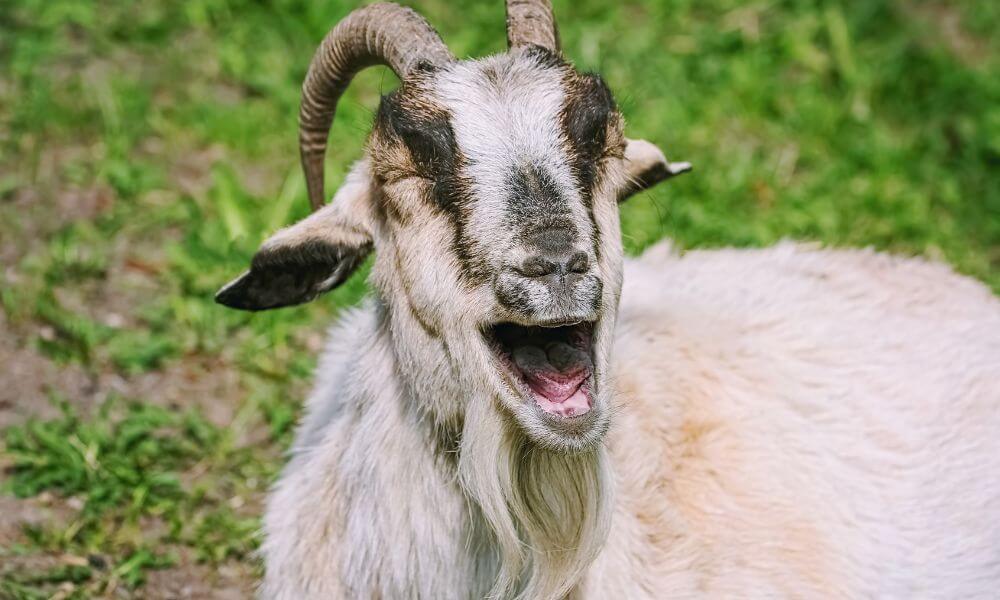So, for practical purposes, the distinction is essentially immaterial.
Goats can experience episodes of paralysis which have stroke-like symptoms, but it’s not exactly the same as in a human stroke where blood to the brain is cut off.
Let’s look further into this.

What is a stroke?
Firstly, let’s define what a stroke actually is, insofar as it relates to human medical science.
A stroke is defined as a very serious, life-threatening condition, an episode in which blood supply to part of the brain is cut off.
This affects motor ability on 1 side—usually the left side—of the body.
Those suffering from a stroke often cannot lift both of their arms, and one side of their face is drooped, unable to smile.
Their speech will be slurred and garbled.
This is caused, as I said, by restricted blood supply to the brain.
This can happen as a result of a blood clot, which accounts for the vast majority of cases. It can also be due to a haemorrhage.
When an organ doesn’t get the blood supply it needs, it doesn’t get the oxygen it needs to function.
Without this, it begins to shut down. Strokes can cause serious long-term damage and are more likely to be fully treated the sooner you are able to get the sufferer medical help.
So, with all this in mind—can it happen to goats?
Can goats have strokes?
In terms of concrete, documented cases of goats having strokes exactly as humans do, we have very little to go on.
There are no peer-reviewed studies on the issue, and thus no scientific or empirical data to suggest, for sure, that goats can have strokes.
That said, there’s nothing about the organization of a goat’s internal organs that suggests they definitely could not have strokes.
Blood clots and haemorrhages could occur in the brain, causing a loss of oxygen flow and thus stroke like symptoms.
In terms of anecdotal evidence, many goat owners have reported that their goat suffered from something like a stroke.
Suddenly appearing to go limp in one half of their body, dragging their legs, even falling down and experiencing seizures.
So, the answer is that goats probably can have strokes.
We just don’t understand with any certainty the mechanism which causes them, as we do with humans.
As I mentioned, in humans, the two main ways you can identify a stroke are by the face and the arms, as they become partially paralyzed.
So, seeing paralysis in goats is one sign that is commonly interpreted as a stroke—so what else can cause paralysis in goats?
What can cause paralysis in goats?
Goats can suffer from a wide range of conditions that can cause paralysis.
Foot and mouth disease is one of the most common and comes in a number of forms.
All of these can cause paralysis in goats, causing them to be unable to walk, sometimes dragging their back legs along, or being unable to move at all.
If your goat is showing signs of foot and mouth disease, you need to contact the authorities as soon as you can.
There is, unfortunately, no medical treatment for FMD, but you can shade the animal from the sun, and give them soft feed.
You can also use various treatments for their wounds on their feet.
Foot rot is another condition that can cause lameness and appear as though paralyzed.
Lesions on the legs and feet are also a common cause of apparent paralysis.
Any of these issues could be interpreted as a stroke, though it’s important that you do understand the difference to be able to apply the proper treatment.
Calling the vet is always your best option.
Seizures are another common stroke-like symptom—let’s look at what causes seizures.
What causes seizures in goats?
Studies have been done into the causes of seizures in goats, to show their overarching causes.
Generally, they have been shown to be structural or metabolic.
Listeria, for instance, can cause a variety of seizure-like symptoms.
Seizures can also come with inherited disorders.
They are just a thing that happens, and there’s not much to be done about it.
Other causes include liver disease, kidney failure, and even brain tumors.
Seizures are relatively common in goats, and given the myriad of potential causes, it’s usually best to contact a vet as soon as you can.
That said, it’s unlikely to be a stroke—but this doesn’t mean it isn’t serious.
Goats may or may not be able to have strokes in the same way humans do, then, we just don’t really know.
We determine the impact and nature of a stroke on humans usually with an MRI or CT scan, which is obviously rarely done on goats.
In any case, they can certainly experience a wide range of phenomena just like strokes, so there’s plenty for you to be on the lookout for.
